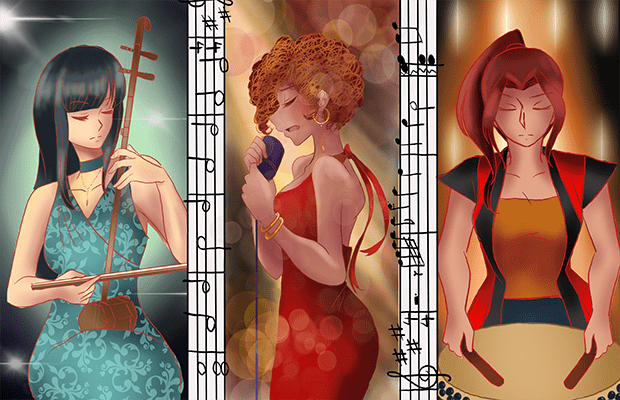It is well established in the media that international students face certain disadvantages in Western universities, especially to do with language. This is an obvious drawback in situations where students are required to participate in class, give marked presentations, and submit academic essays. But how does this go in a music degree, where most international students are admitted on a performance basis? Despite most students being talented performers, and with the university generally having a high English requirement (IELTS 6.5), there is still a dis-advantageous gap of understanding for some students, even when studying the so-called universal language of music.
Recently, teachers across the Conservatorium created a new expectation for students to address their audience before they perform, including introducing the work and the composer. Previously, students would simply walk on stage, perform, bow, then leave. The new expectation was introduced to keep in line with current practices in concert halls and chamber settings.
Briefly discussing the work prior to performance benefits the audience in the way that it offers some history, context, understanding, and perhaps key things to listen out for, such as structural diversions or interesting tonalities. But playing to professors and fellow students in a class setting, this practice compels performer to understand, at least partially, the background of any given musical work. This is extremely different to the way most East Asian students were taught, which make up the majority of the piano cohort, at least. There is less emphasis on holistic learning about music and more about striving to achieve the end result — playing, rather than complete understanding. This is doubly difficult for international students not yet fluent in English, since they are able to perform the piece flawlessly, yet they are unable to introduce their piece at a level the teachers/markers find acceptable, let alone eloquently express their interpretation of the piece’s meaning.
Tertiary education often comes as a shock. We leave the guided instruction of our secondary teachers and we are suddenly expected to engage in discourse and independent research. At the Conservatorium, it first comes in doses, perhaps which edition of the score you choose. Shortly into your degree however, alongside theoretical and historical study, you are confronted with a huge responsibility of the choices you are expected to make within your performances. You are expected to interpret the piece according to historical convention but also to justify your choices, like bringing out certain melodies over others or choosing a particular tempo.
This is encouraged by teachers predominantly through descriptive or metaphorical language, and you are also expected to express independent thought. While there are obvious limitations between English-speakers and international students, this goes beyond language barriers and into the very conception of learning, practice, and the music itself.
I spoke to Wendy Chen, a student from Hainan in the Music Studies degree, majoring in classical piano. She talked to me about overcoming such differences.
“The main problem is as a Chinese, the way I think is different to Western people and those academic words that appeared in the class. We have totally different ways to think and express.”
Wendy described the different styles of teaching she encountered: in Hainan, teachers would typically explain their meaning through playing any particular passage or instructing the student to play louder or softer here. But coming to the Sydney Conservatorium, and learning from a European teacher, she said, “You need to have a good understanding of English, he always uses metaphors. I was super confused about what he was trying to teach me, when he asked me to stay in the garden and think. I didn’t know what he said, he just wrote down all he wanted me to know and I used Google to translate after class.”
I learnt from the same teacher for some time, who often told me to not over-practise and instead to watch the grass grow — “That will do more for you than another hour of practice.” This seems to stem from a well-known quote attributed to concert pianist Arthur Rubinstein:
“Never practice more than three or four hours a day. No one can concentrate longer than that, and you must spend the rest of your time learning about life and love and art and all the other wonderful things in the world. If a young person sits in the practice room all day, what could he possibly have to express in his music?”
This is a completely different mindset to those trained to believe that only diligence and academic rigour leads to success. On this, I spoke to Ryan Tu, an international student in his fourth year of the Horn Performance degree.
“So, back in my hometown, I had a pretty straight forward music education. It is like, do whatever the teachers tell you. Like the teacher tells me to learn a piece, I learn a piece. You kind of rely on the teachers a lot. But after coming here, the teachers would actually ask, why do you want to learn that piece? How do the different notes and phrases function in the music? Like how all the little details fit into each other. I think it gave me a more in-depth insight into music and more freedom to learn.”
“The history of different composers and their pieces were one of my biggest difficulties when I started studying in Sydney. Back in Hong Kong, I only learned the surface of their backgrounds. After coming here, there is a lot to learn.”
Unlike a mathematics or engineering degree, where there is less reference to meaning and language, the way we learn, play, and perceive music, is heavily informed by our language and culture. While there are increasing numbers of international students in Australian universities and more Western teachers, and even institutions, there remains a divide in communication that even music cannot always reconcile.





